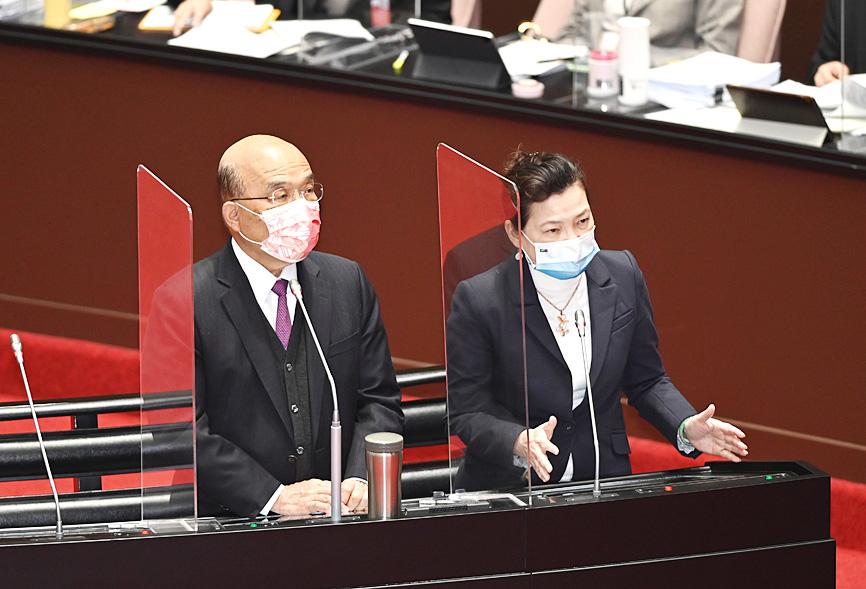The Ministry of Economic Affairs is planning to allocate NT$200 million (US$6.7 million) to help local food producers expand their overseas footprint, including in Asia and North America, to help them mitigate the impact of China’s import bans.
The subsidy program, dubbed “Taiwan Food Go to the World,” would provide guidance to food producers on marketing and finance to help them overcome difficulties due to import bans China imposed on Taiwanese food brands on Monday last week, the ministry said yesterday.
China is the third-largest export destination for local processed food companies, accounting for 20 percent of Taiwan’s overall processed food exports, the ministry said.

Photo: Tien Yu-hua, Taipei Times
The ministry is in talks with Redmart, Singapore’s biggest online grocery store, and Japanese online retailier Rakuten to sell Taiwanese food products, it said, adding that it hopes the initiative would give producers a boost as early as October.
The Council of Agriculture on Tuesday last week said the blacklisted companies include producers of tea leaves, dried fruits, honey, cocoa beans and vegetables, as well as the catches from about 700 Taiwanese fishing vessels.
China said the suspension was related to the companies’ compliance with a new customs registration system that it introduced in April last year.
However, several Taiwanese companies whose registrations on the system are up to date were also affected by the ban.
The government is promoting the sale of processed Taiwanese food products and agricultural products to other markets to help producers overcome the China trade challenges, Minister of Economic Affairs Wang Mei-hua (王美花) told reporters.
The government would help manufacturers market their products mainly in 13 countries, including Japan, Malaysia, Singapore, South Korea, the US and Vietnam, she said.
Companies that market their products on foreign Web sites would receive a subsidy of NT$100,000 and those that hold promotion activities can apply for a subsidy of NT$200,000 for up to five events each, she added.
The ministry would organize sales promotion events in countries such as Singapore and Malaysia, and participate in food-related activities and exhibitions, she said.
The program would benefit about 2,000 manufacturers, adding an expected US$60 million to their combined revenue, she said.
The ministry hopes the program can help companies diversify their target markets and bring Taiwanese delicacies to more countries, she said.
Additional reporting by Lisa Wang

UNCERTAINTY: Innolux activated a stringent supply chain management mechanism, as it did during the COVID-19 pandemic, to ensure optimal inventory levels for customers Flat-panel display makers AUO Corp (友達) and Innolux Corp (群創) yesterday said that about 12 to 20 percent of their display business is at risk of potential US tariffs and that they would relocate production or shipment destinations to mitigate the levies’ effects. US tariffs would have a direct impact of US$200 million on AUO’s revenue, company chairman Paul Peng (彭雙浪) told reporters on the sidelines of the Touch Taiwan trade show in Taipei yesterday. That would make up about 12 percent of the company’s overall revenue. To cope with the tariff uncertainty, AUO plans to allocate its production to manufacturing facilities in

TAKING STOCK: A Taiwanese cookware firm in Vietnam urged customers to assess inventory or place orders early so shipments can reach the US while tariffs are paused Taiwanese businesses in Vietnam are exploring alternatives after the White House imposed a 46 percent import duty on Vietnamese goods, following US President Donald Trump’s announcement of “reciprocal” tariffs on the US’ trading partners. Lo Shih-liang (羅世良), chairman of Brico Industry Co (裕茂工業), a Taiwanese company that manufactures cast iron cookware and stove components in Vietnam, said that more than 40 percent of his business was tied to the US market, describing the constant US policy shifts as an emotional roller coaster. “I work during the day and stay up all night watching the news. I’ve been following US news until 3am

COLLABORATION: Given Taiwan’s key position in global supply chains, the US firm is discussing strategies with local partners and clients to deal with global uncertainties Advanced Micro Devices Inc (AMD) yesterday said it is meeting with local ecosystem partners, including Taiwan Semiconductor Manufacturing Co (TSMC, 台積電), to discuss strategies, including long-term manufacturing, to navigate uncertainties such as US tariffs, as Taiwan occupies an important position in global supply chains. AMD chief executive officer Lisa Su (蘇姿丰) told reporters that Taiwan is an important part of the chip designer’s ecosystem and she is discussing with partners and customers in Taiwan to forge strong collaborations on different areas during this critical period. AMD has just become the first artificial-intelligence (AI) server chip customer of TSMC to utilize its advanced

Six years ago, LVMH’s billionaire CEO Bernard Arnault and US President Donald Trump cut the blue ribbon on a factory in rural Texas that would make designer handbags for Louis Vuitton, one of the world’s best-known luxury brands. However, since the high-profile opening, the factory has faced a host of problems limiting production, 11 former Louis Vuitton employees said. The site has consistently ranked among the worst-performing for Louis Vuitton globally, “significantly” underperforming other facilities, said three former Louis Vuitton workers and a senior industry source, who cited internal rankings shared with staff. The plant’s problems — which have not